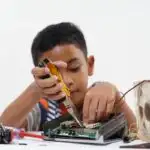Undertaking the high school homeschooling experience demands meticulous planning and diverse resources, and by drawing from our own experience, we’ve put together a comprehensive guide to all of the supplies that home-based educators will need in order to deliver a well-rounded and comprehensive education for their students.

Curriculum Selection and Textbooks
Selecting a curriculum tailored to individual learning styles is pivotal for success, so investigate those that offer flexibility and alignment with state standards and look for textbooks that not only cover the subject matter comprehensively but also incorporate and include real-world applications and examples.
You should also consider online resources that provide supplementary materials, video lectures, and interactive simulations to enhance your student’s understanding of the subjects in question.
See also: Homeschooling In High School – Pros And Cons
Digital Learning Tools
Supplementing traditional methods with digital tools is crucial in the internet age, as is exploring a variety of online platforms such as Khan Academy, Coursera, and educational apps tailored to high school subjects.
Making sure that these tools provide interactive experiences, quizzes, and assessments can reinforce what you’re teaching, and including virtual labs and simulations, you can also offer much-needed practical experience in subjects like physics, chemistry, and biology.
Hands-On Science
Elevate science by investing in quality hands-on materials, such as lab kits that cover a range of experiments, that will enable students to gain practical experience in biology, chemistry, and physics and look for resources that align with high school science standards, and promote inquiry-based learning.
Field trips to local science museums or nature reserves to complement theoretical knowledge with real-world observations are also a good idea and can transform otherwise dry subjects into captivating and interesting topics.
Artistic Expression
Nurturing creativity involves a diverse array of art supplies, so go beyond the basics and include materials for painting, sculpting, and graphic design, and enroll your students in online art classes to provide structured guidance and exposure to various artistic techniques.
Math Manipulatives For Conceptual Understanding
Enhance math education with manipulatives that promote conceptual understanding and include everything from algebra tiles to geometric models and hands-on tools that aid in visualizing abstract concepts.
Incorporate manipulative-based activities to reinforce mathematical principles and problem-solving skills and explore real-world applications of mathematics, such as budgeting, statistics in sports, and geometric concepts in architecture, to demonstrate the relevance of mathematical concepts in real-world situations.
Writing Resources For Effective Communication
Effective communication skills are crucial in every facet of life, so provide a diverse range of writing resources, including style guides, grammar tasks, and writing prompts, and engage students in various writing genres, from persuasive essays to creative fiction, to help hone their communicative abilities.
Consider collaborative writing projects and peer reviews to enhance critical thinking and constructive feedback skills and encourage students to participate in writing contests or publish their work online to create a sense of accomplishment and pride in their writing abilities.
Reference Books And Building A Home Library
Building a home library is an ongoing investment in knowledge, so try to curate a collection of reference books spanning various subjects, including history, science, literature, and language arts.
If you do, make sure you include diverse perspectives and authors to encourage a broad worldview and build a love for independent research by introducing students to advanced reference materials, such as academic journals and encyclopedias, and utilize online databases and digital libraries to access the wealth of information that’s readily available online.
Educational Games And Critical Thinking
Integrating educational games requires thought, so choose games that promote critical thinking, problem-solving, and strategic planning, as they not only make learning enjoyable but also stimulate cognitive development.
Board games are also a useful resource as they involve logical reasoning, as are card games that enhance memory and quick thinking, and digital games that challenge students in mathematics, language arts, and science.
Including game-based learning in lesson plans can make education an interactive and engaging experience.
Language Learning Tools
Create multilingual proficiency with a variety of language learning tools and learning apps, interactive courses, and cultural immersion experiences can enhance language skills by encouraging students to engage in language exchanges with native speakers, watch foreign films, and explore literature in different languages, it can transform one of the hardest subjects most students will attempt into one of the most interesting and engaging.
By incorporating technology, such as language learning software and online conversation platforms, you can provide a dynamic and interactive language learning experience.
SAT/ACT Prep Materials
Effective preparation for college entrance exams involves a comprehensive approach. This is why it’s important to invest in a range of prep materials, including official study guides, practice tests, and online resources.
By providing access to tutoring services or peer study groups to create a collaborative learning environment, you can simulate test conditions in order to familiarize students with the exam format and build confidence in their abilities.

Computers And Software For Digital Literacy
You can increase digital literacy by providing access to a reliable computer with essential software that can familiarize high schoolers with productivity tools, coding platforms, and multimedia editing software.
Introducing coding languages such as Python, JavaScript, or HTML can help students develop programming skills, and by encouraging them to engage in online courses in digital literacy, cybersecurity, and information technology, you can prepare students for the demands of the digital age and a rapidly changing and constantly evolving world.
Organizational Tools And Time Management
Effective time management is a skill that transcends academia, so introduce planners, calendars, and time-tracking apps to instill the organizational skills that are crucial for academic success and teach students to set realistic goals, prioritize tasks, and allocate time efficiently.
Offering guidance on creating a study schedule that balances academic responsibilities with extracurricular activities and personal interests and encourages the use of project management tools for collaborative assignments and as a way to enhance teamwork and personal accountability.
Stationery Supplies
Creating a conducive study space involves attention to detail, so stock up on quality pens, notebooks, highlighters, and other stationery essentials, as a well-equipped study space can enhance focus and productivity.
Ergonomic furniture and adequate lighting can also create an environment conducive to learning, and by personalizing the study space with motivational quotes, inspirational posters, and plants, you can create a positive and inspiring atmosphere that emphasizes the importance of maintaining an organized and clutter-free study area to minimize distractions and optimize concentration.
Extracurricular Resources for Personal Growth
Beyond core academics, encourage personal growth through extracurricular resources by providing access to sports equipment, coding tools, musical instruments, and other resources that align with high schoolers’ interests and aspirations.
Support involvement in clubs, organizations, and community service projects to help build leadership and encourage teamwork, and by facilitating opportunities for internships, job shadowing, and mentorship programs, it’s possible to expose students to diverse career paths and develop practical skills.
Physical Education Materials
Incorporate physical education materials that promote health and fitness, including sports equipment, fitness apps, and guides for home workouts that create a unique approach to well-being by emphasizing the importance of regular exercise, healthy nutrition, and mental wellness.
Introduce students to a variety of physical activities, from traditional sports to yoga and mindfulness practices, and by collaborating with local fitness experts and trainers, you’ll help to promote an active and healthy lifestyle among your students
Home Economics Supplies For Practical Life Skills
Teaching practical life skills is integral to high school education, so introduce cooking utensils, sewing kits, and budgeting tools to impart essential home economics knowledge and create hands-on lessons in meal planning, basic sewing techniques, and financial literacy.
Explore online resources that teach practical skills such as home maintenance, car care, and personal finance so students can participate in classes that teach household responsibilities and contribute to a sense of independence and competence in practical life matters.
Debate And Public Speaking Materials For Effective Communication
Cultivate effective communication skills through dedicated debate and public speaking materials and invest in debate guides, public speaking courses, and resources that encourage articulation and persuasion.
Form a debate club or public speaking forum where students can practice and refine their communication skills in a supportive environment and organize mock debates, panel discussions, and speech contests to provide opportunities for public speaking experience and include topics that span various disciplines, which will help students to research, analyze, and present their viewpoints on current events and societal issues.
Musical Instruments
Encourage artistic expression through the exploration of music and access to musical instruments, as music can instill a deeper appreciation for the arts, which is why we’d always encourage students to study music theory, composition, and the history of different musical genres.
Coding And Programming Tools For Technological Literacy
Technological literacy is vital in our online society, and introducing coding and programming tools and kist will allow high schoolers to develop practical skills in a technology-driven world.
Encourage the creation of digital projects, apps, and websites that will ensure that they apply their coding skills in real-world contexts and reinforce the importance of problem-solving, creativity, and continuous learning in the rapidly evolving field of technology.
You may also like: A guide to homeschooling middle school kids.
In Summary
High school is a critical juncture in every student’s life, and a thoughtful selection of homeschooling supplies, combined with flexibility and attention to high schoolers’ evolving needs, can make the experience both enriching and academically fulfilling and will make sure that it really does become a time that they’ll always remember, for all the right reasons.
Further reading: Do homeschoolers get a diploma?
- Homeschooling In High School: Pros And Cons - February 24, 2024
- How Do I Withdraw My Child From School To Homeschool? - February 23, 2024
- How To Not Go Crazy Homeschooling Kids: A Guide For Frazzled Parents - February 22, 2024









Leave a comment